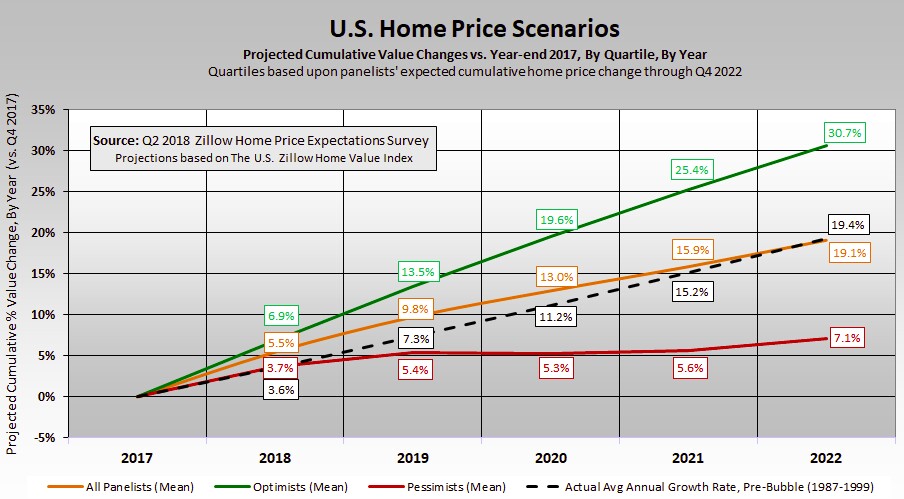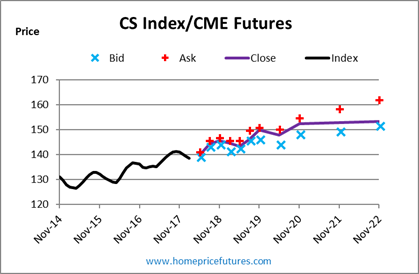Every quarter Zillow and Pulsenomics collaborate to survey a little over 100 real estate experts to establish a home price forecast for the nation. A couple of days ago they released their 2nd Quarter Home Price Expectations Survey which shows further improvement in their outlook for the real estate market. They’ve been raising their forecast in each of the past few quarters. For instance, last quarter their 5 year outlook was for 18.2% cumulative appreciation. This quarter it’s for 19.1%. The graph below lays it out by year. Click it for a larger version.
If you compare this graph to the one shown last quarter you will see that most, if not all, of the improved outlook occurred in 2018-2019. Their 2018 forecast went from 4.8% to 5.5% and the cumulative forecast through 2019 went from 8.7% to 9.8%.
The press release doesn’t give much explanation as to why the experts increased their forecast other than for Terry Loebs, the founder of Pulsenomics, to say:
Constrained home supply, persistent demand, very low unemployment, and steady economic growth have given a jolt to the near-term outlook for U.S. home prices. These conditions are overshadowing concerns that mortgage rate increases expected this year might quash the appetite of prospective home buyers.
With these quarterly surveys they usually throw in another question or two. This quarter they asked the experts when they see the next recession coming and what will cause it. According to the press release:
Overall, nearly half of all the experts surveyed expect the next recession to begin sometime in 2020, with Q1 being the most commonly selected quarter. More than half of the survey respondents pointed to monetary policy as the likeliest cause.
Then they go on to quote Zillow senior economist Aaron Terrazas who tries to put a positive spin on this tighter monetary policy: “meaningfully higher interest rates should eventually slow the frenetic pace of home value appreciation that we have seen over the past few years, a welcome respite for would-be buyers.” I find that humorous because lower prices with higher interest rates doesn’t make life any better for home buyers. Not to mention that, as I’ve pointed out before, I don’t think higher mortgage rates necessarily mean lower home prices.
They also got the panelists perspective on how mortgage availability has changed since the housing crisis. 70 percent said that not much has changed for borrowers with the best credit histories but half of the panelists said that it’s become more difficult to get a mortgage for “more typical borrowers with less-stellar credit histories”.
Well, we’ve been hearing a lot about this lately and it is becoming a political football. Lots of hand wringing about lower income people not being able to get mortgages and not achieving the American dream and lower home ownership rates. It’s so totally ironic because when it was easy for people with lower credit scores to get mortgages and then they defaulted it was declared predatory lending. Now that the lenders stopped doing that it’s unfair. Damned if they do and damned if they don’t.
Outlook For Chicago Area Home Prices
Coincident with the quarterly release of the home price expectations survey I like to check out the Case Shiller home price futures contracts for Chicago as an indication of where Chicago area home prices are going. I get my data, including the graph below, from John Dolan who is the market maker for the contracts and operates the Web site I just linked to.
As you can see in the graph the market is basically predicting flat pricing beyond 2020. The total implied price appreciation from September 2017 – September 2022 works out to about 2.2% per year, which is down from 2.8% per year when I checked 3 months ago. That’s a pretty dramatic decline in just 3 months. So while the outlook for the nation improves the outlook for the Chicago area worsens.
#ChicagoHomePrices #HomePrices
Gary Lucido is the President of Lucid Realty, the Chicago area’s full service discount real estate brokerage. If you want to keep up to date on the Chicago real estate market, get an insider’s view of the seamy underbelly of the real estate industry, or you just think he’s the next Kurt Vonnegut you can Subscribe to Getting Real by Email using the form below. Please be sure to verify your email address when you receive the verification notice.

